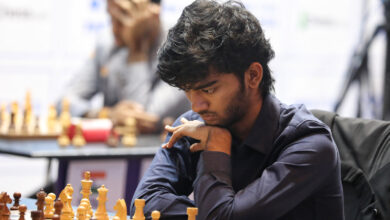Why Virat Kohli has to open and Rishabh Pant fits better at No 3 on sluggish tracks | Cricket News

It’s clear to everyone that Rishabh Pant has come a long way. From a return to competitive cricket a few months ago, after nearly 18 months on the sidelines, to getting selected for the T20 World Cup and now the unorthodox X-factor at one down.Mid-way during that IPL, he shrugged off a rousing challenge from Dinesh Karthik to join Sanju Samson in the wicket-keeper race but even at the end of that t20 tournament, it wasn’t clear cut that he would be batting at No.3 for India in the world cup.
Such has been his rise that now the murmurs have begun if he should displace Virat Kohli as an opener. It would be a surprise if India go that way against Bangladesh on Saturday but it’s an interesting exercise to delve into.
It’s fascinating to see how both batsmen’s relative weaknesses makes them ideal to be played in the top order.
Pant’s record lower-down, despite the perception based on his freestyle walloping, isn’t flash and Kohli matches the perception about him that he won’t be ideal anywhere below No.3.
The exercise then becomes how to maximise their potential – and here again their relative weaknesses load up the tarazu weighing scales. Especially in the sluggish conditions on offer thus far in the tournament.
If Rishabh Pant opens, on a good day when the openers aren’t separated for at least four-five overs, it leaves Virat Kohli staring into the middle-over expanse. If the tracks slow up post the powerplay as they have generally done, then a freshly-in Kohli would have a few decisions to take. In theory, he could play the situation, nurdle the ball around for say a 30-ball 25 or 35, before he tries to free his arms. The idea is that his technically-proficient batting will be suitable to negotiate that phase.
But as we saw against Afghanan on Thursday, it will be the old Kohli style of batting. He has to extend himself to crack out the boundaries and sixes in such conditions where the ball stops a touch on landing. If India are looking to consolidate in this phase, then it’s not a problem, but if they are intent on trying to be aggressive as their stated and attempted objectives have been this tournament, then he might not be the right fit there.
The sluggish tracks need either the outrageousness of Pant, who will wriggle and contort his body, charge, reverse, trust his instincts or plain slog to make the pitch seem better than it looks. Or it will require the serenely-intelligent body-positioning and crafty shot-selection of Suryakumar Yadav. Both have done it so far. Pant against Pakan and briefly against Afghanan, and on Thursday, Suryakumar showed why he is the best No.4 in the world.
It’s difficult to visualise Kohli in either avatar. His attacking shots against seamers are now two: the charge and smash through line, or walk down or shuffle across to forcefully swat-heave to the on side. His other regular great shots are beside the point as the attacking shots here are defined as those go-to strokes he does when he wants to hit a particular ball regardless of where it lands or how good it is. That is when he wants to break-free or dictate terms. Both Pant and Suryakumar have more options to do so on sluggish tracks.
Kohli’s break-free shots against spinners on these tracks are gradually growing, ever since he dusted off his slog-sweeps (he had used just two in his highest Test score of 254 in Pune in 2019 against South Africa that had 35 boundaries) and used them a lot more this IPL. He tried a couple of times against Afghanan as well, though they didn’t quite connect as well as he intended. But that’s a shot now that one can reliably state he would go for every now and then.
If he is convinced that ball isn’t turning much or if he is really desperate to break-out, he can charge the spinners too. As he did once but failed against Afghanan, he also shuffles outside leg to try cut the spinners from the stumps through the off side ring. Or just stretch and try to chip up and over, like he tried against Rashid Khan but holed out.
But again, Pant and Suryakumar both have greater arsenal against spin. If anything with Pant, he can combust trying one too many; his repertoire is that wide.
That leaves Kohli and Pant with the opening slot question. The advantage of Pant in powerplay is obvious – potentially more runs in lesser time than Kohli but with the risk of losing him before the middle-overs (7 to 15) where he has the game to rise above the sluggishness of the pitch and get quick runs.
And considering Kohli has been trying his utmost best to change his game in the powerplay through the IPL, if he comes off, then he won’t be too far behind Pant in that phase. Kohli’s attacking moves are predictable against the new ball: the charge-and-smash ala young Tendulkar though without that kind of consency yet, the reach-out square and cover drives that also can get his wicket, the leg-side wry whips and the pulls on a good day. In the first few games, he tried to go all out in the spirit of an evangel, but it didn’t come off. Against Afghanan, he was more circumspect before he fell.
But against a newish ball that comes on to the bat better than it would a little later and in conditions where it doesn’t seam or swing too much, the new-Kohli is still better equipped if he can find the right balance he needs to kickstart a knock. Rohit Sharma’s form isn’t helping him either but suffice here to say that if India wants to continue with their aggressive intent particularly if the pitches remain sluggish, then Kohli will have to open. If the pitches ease out to be batting beauts, then he can do the job in middle overs in theory, but as things stand, Kohli the opener has to find an aggressive way that works.







